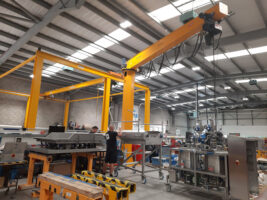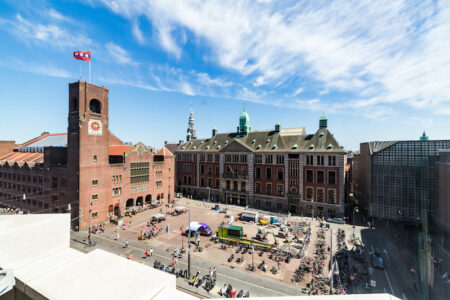Exclusive: Behind the scenes at TNA’s UK equipment manufacturing facilities

As a key regional base for its equipment operations, TNA’s Birmingham facilities are a vital cog within its global work, as associate editor Kathryn Brand discovers
TNA Solutions recently held an open-house event, dubbed ‘Feeding Ambitions’ at its UK headquarters at Woodgate Business Park, Birmingham, UK.
Confectionery Production was in attendance, and was granted a tour of some of the technologies TNA showcased at Interpack, such as its virtual factory experience, the tna robag 3e and tna auto-splice 3, tna ropac 5, tna intelli-flav OMS 5, as well as a tour of the facility itself. During the day, we spoke to TNA’s Simon Eggleton, divisional sales manager for Europe, and Bindu Panicker, brand and corporate communications manager, in order to better understand the operations of the UK office, and how it fits into TNA’s global operations.
When the Birmingham facility opened in 2013 as TNA’s ‘European manufacturing hub,’ it was the first TNA location outside of Australia, but it is now joined by six other manufacturing hubs: three in Australia, where TNA originates, one in China, one in the Netherlands, and one in Portland, US. TNA Europe in Birmingham then has satellite offices, including Germany and South Africa, that report to the Birmingham location. “European customers, they like that we’re close to them; they can come and see us if they want to. We’ve got sales managers and engineers based remotely from the office. So we’ve got the languages and the cultures in line with them as well,” explained Eggleton.
“They can speak to us in the same working day – if we were only based in Australia, we’ve got that huge offset in time.” Each manufacturing hub has its own speciality, or ‘Centre of Excellence,’ which for Birmingham is distribution and seasoning, explained Eggleton.
Meanwhile, Australia specialises in bag makers and confectionery equipment, China does base components, Netherlands the continuous fryers and French fry lines, and then Portland focuses on batch fryers, granting each its own equipment speciality.
On a tour of the factory floor at the facility, Andy King, UK manufacturing manager, TNA, explained how the machines were constructed from start to finish in this As a key regional base for its equipment operations, TNA’s Birmingham facilities are a vital cog within its global work, as Kathryn Brand discovers Equipped for the future location, from the delivery of sheet metal, to the fabrication and welding, and finally the software and testing process. Because of this, the machines were extensively customisable, with different finish and sizing options depending on the type of product and the amount of product it is going to be used for. Quality is the more important thing that they focus on when building the machines, said King.
TNA has invested heavily on welding equipment for accuracy and consistency for all its builds, ensuring that a customer can repeat buy a piece of kit, and it would be exactly the same as one they bought previously. The quality requirements also lend into the testing process. King’s team will run every machine for 24 hours before shipping, to ensure its reliability for long production cycles, and that the software is up to scratch, before it even arrives to the customer; something they refer to as ‘Plug and Play,’ which reduces the downtime the customer will face at installation.
What’s more, the Birmingham facility still houses each generation of machines it has built, so it can support customers with the machines they sold 40 years ago and continue to provide them with parts. TNA Europe in Birmingham is the company’s biggest region, and has been for the last couple of years, according to Eggleton; “Probably about a quarter to a third of TNA’s sales come through TNA Europe,” and Eggleton is hoping this share will continue to grow as they develop the European market.
“When we look across the European region, some of its very established markets like the UK and Germany and the Netherlands, they are very established in snacks. And then we have Eastern Europe, which is a developing market and then we have Africa below the equator as well, which is also a developing market. So we have to deal with both established and developing markets from this location. So we would expect our sales to grow,” Eggleton revealed.

In 2017, TNA acquired NID Confectionery Solutions, aiming to get closer to offering complete confectionery solutions from a single source. Eggleton explained, “When we first took on NID, we weren’t that known for doing confectionery, and NID kind of had a tough time, but we’ve had some people do some really excellent work going out, meeting the customers, rebuilding NID’s reputation as a TNA family member.”All the brands TNA have acquired are now integrated “into the TNA fold,” said Panicker, so NID is now known as TNA Confectionery.
Eggleton continued, “Customers are out there seeing that TNA have got this equipment that’s got a good brand reputation again and that we can deliver to them. So we are seeing a lot of growth in it, especially in Europe. Seven years ago, we’ve got nothing and now we’re actually planning it in as a whole sector of our business.”
Hybrid working
There are currently 85 people working at the 50,000 sqft TNA facility in Birmingham, which is pretty much the facility’s capacity, however since the pandemic, they have been operating a hybrid working model, like so many companies, so not everyone is in at the same time. Nevertheless, Eggleton spoke about a possible move in the company’s future. “We’ve got more people joining all the time, so we’ve probably got to look at the move at some point.” This possibility is also being discussed in relation to TNA’s sustainability efforts.
Since moving into the Birmingham facility, they have upgraded the heating and other such alterations, to make it more energy efficient, but there is only so far the facility can allow them to go. Moving to a more sustainable facility could help them better meet their targets. Panicker explained that TNA is due to release a sustainability update and report on its own practices, where it is currently at and where it hopes to be in the next five to ten years. Panicker commented on this in relation to the sustainability of its Birmingham facility; “Our financial year, FY24, we’re going to start reporting on sustainability because we’re setting goals for ourselves in terms of where we want to be. So a lot of that will, of course, be in terms of looking at green building designs and things like that, but also look at things like diversity and inclusion.” On its sustainability review, Eggleton added: “You’ve got to either do it yourself or you’re going to be dragged kicking and screaming. So TNA have made the decision that we’re going to start doing it now. It’s one or the other.” Eggleton continued, “You’ve got to do it because it’s the right thing to do. But if you as a business don’t, your customer is going to tell you you’ve got to do it and it’ll be far more painful if you wait for that. “So you may as well get onboard really quick with it and do the right thing.



